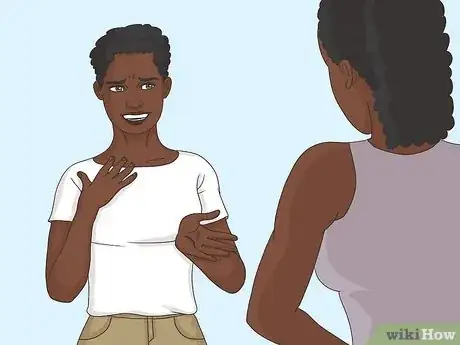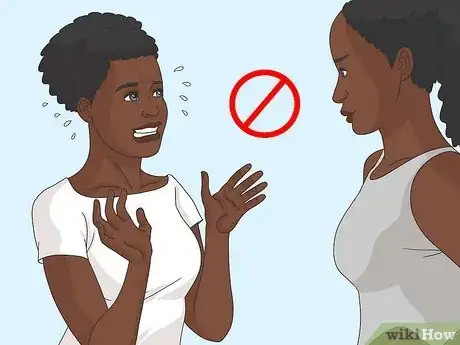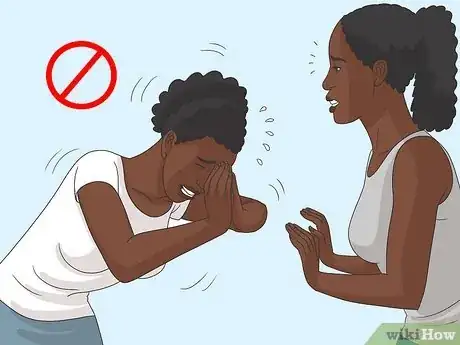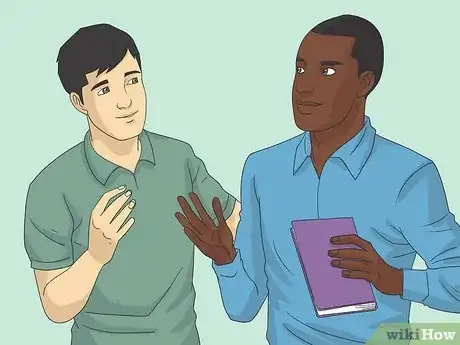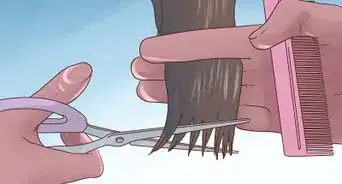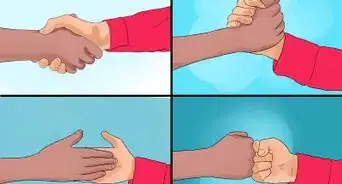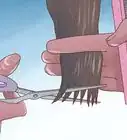This article was co-authored by Tasha Rube, LMSW. Tasha Rube is a Licensed Social Worker based in Kansas City, Kansas. Tasha is affiliated with the Dwight D. Eisenhower VA Medical Center in Leavenworth, Kansas. She received her Masters of Social Work (MSW) from the University of Missouri in 2014.
There are 7 references cited in this article, which can be found at the bottom of the page.
This article has been viewed 88,413 times.
You've heard it time and time again: first impressions are lasting. This universal warning can feel like a death sentence when that ever-important first impression has been terribly bungled. Whether your first impression requires positively representing your company in the deal of the century or getting a blind date to agree to seeing you again, you can recover after a failed first attempt. It won't be easy, but it is possible to bounce back after a bad first impression.
Steps
Recovering After the Failed Joke
-
1Don't beat yourself up. Realize that everyone makes mistakes, and, at some point in their life, everyone says or does something they wish they hadn't. Try not to magnify the situation in your head. Also, avoid dwelling on it inwardly or outwardly. Everyone falls victim to social gaffes. If you dwell on your small misstep, you may actually make the situation worse.[1]
- If you are a person who tends to blow simple mistakes out of proportion, just show yourself some compassion after bungling a first impression. Maybe it will be helpful to repeat this phrase silently in your head right after: "You're only human. You're only human."
-
2Show your sense of humor with a little self-deprecation. If an awkward silence ensues after your failed joke, say something like "It sounded funny in my head!" or "Wow, that wasn't funny at all". Such a remark shows the person or group that you read their responses and know that your joke fell flat.
- A brief self-deprecating comment reveals that you don't take yourself too seriously. Just be sure not to refocus the lens and spend the whole time putting yourself down for the benefit of impressing others.[2]
Advertisement -
3Move on. As quickly as possible, move on to another topic. Don't allow your gaffe to derail the conversation, which will only make you feel mortified. Once the ball gets rolling, make an extra effort to engage, asking questions and presenting your own opinions. Taking a more serious approach during the remainder of the meeting verifies that you're not all fun and games.
- There are several ways to expertly change the subject in a conversation. In this case, returning to an earlier topic would probably be sufficient. Whatever the topic was prior to your failed joke, bring everyone back around. Say something like "So, you were telling me about your parents..." or "I can't believe the company has made such significant returns this year. That's great!"
-
4Wait a little while until you try another joke again. Telling jokes around people you first meet will always be hit or miss. Take some time to read the temperature of the individual people or the culture of the office where you work. If you notice others regularly telling lame jokes, you may take another jab at sharing a joke or two with no harm done. Just be sure to save graphic or vulgar jokes for your closest friends.
Recovering After Making an Inadvertent Offence
-
1Acknowledge the mistake with sincerity, and apologize.[3] Even though you may want to disappear into the back of your chair, the other person will only become more offended if you act as if nothing happened. Pointing out an wrongful assumption or biased statement takes courage. Owning up to the mistake may put you back in the person's good graces.
- Calmly acknowledge the gaffe by saying something like "That was just my opinion. Forgive me for being short-sighted." Then, make a sincere plea to understand the person better. "Would you mind sharing your opinion of X?"
-
2Avoid trying to justify or change what's been said. This could cause even a greater problem for you. Sometimes, when people realize they've rubbed someone the wrong way, they immediately rush to a defense such as "Oh, I didn't mean that!" Obviously, you wouldn't have said it if you didn't mean it. So, refrain from stating this as it makes you appear hypocritical, like you're jumping from one position to another based on the people around you.
-
3Avoid over-apologizing.[4] While it's important to acknowledge your mistake and try to make amends, please don't go into a long rant of endless apologies. Doing so puts the other person in an awkward position, in which they feel the need to console you - not the other way around.
- A quick apology can sound like "Geez, I'm sorry to have offended you. My knowledge on this topic appears to be limited. Can you explain it to me so that I can see it from your point-of-view?" Taking this route gets the apology out of the way, but also allows the person to share their expertise - and allows them to see you as a human that made a simple mistake but who can own up to it.
-
4Give the person some space, if possible. This signals to the other person that you are aware of your misstep and giving them - and yourself - time to regain your composure. Excuse yourself and go get a drink, or use the restroom. Take a deep breath and exhale away your embarrassment or anxiety. Remember that you may be viewing the situation larger than the person, so, when you return, act calm and competent.
- Space may not always be possible, particularly during presentations or job interviews. During such occasions, it's important to move forward and change the subject to something less tense. Ask the person a question about the position you are applying for, or give them the opportunity to explain a concept to you.
Covering Your Bases
-
1Project humility. [5] If you get on someone's bad side during a first encounter, it's hardly a bad idea to humble yourself. People frequently put their foots in their mouths when they are nervous or self-conscious. Explain this to the other person. However, don't come off as if you are making an excuse for your behavior. Odds are, the person has once been in your shoes; they may understand where you're coming from.
-
2Try a pivot.[6] Sometimes, a misstep is not so obvious and you may not be presented with an opportunity to apologize for something you said or did. In these cases, it's best to display pivotal behaviors that counteract the offensive ones.
- If your shyness is being received as rudeness, make an effort to smile more, start a conversation, and ask the other person questions. This can happen without any indicator to them that you are making a pivot. They will assume they judged you too quickly and assimilate these new interactions into their impression of you.
- On the contrary, if you have a tendency to come off as over-bearing and you ruffle someone's feathers, quickly adjust your behavior as needed. You might try to sit back and not respond to every statement made, but rather nod your head, smile, and listen more. This also works for interruptions, which can be seen as offensive in some settings. Acknowledge the misstep by saying "My apologies for the interruption." and ensure that your subsequent behavior is characterized by taking turns and listening until the other speak has finished.
-
3Don't pretend you're something you're not. Many social faux pas happen during first impressions because a person is putting on airs. Be yourself when you meet new people. Or, better yet, be the best version of yourself. If you don't like speaking in front of others, don't put yourself in an uncomfortable position by signing up to lead a presentation. This might lead to a bad, false impression.
- Instead, highlight the talents that you do have. If you're highly organized, you can volunteer to put together the information packets for the presentation or research complicated concepts that may need explaining. You won't be the focus of the presentation by doing this, but you will still be acknowledged for your organizational skills, or for your in-depth knowledge when someone poses a complex question.
-
4Ask for advice. Some people wince at the idea of asking another person for help. Considering that the person you are asking for help is one you've just badly impressed, asking can be that much harder. You may think the person will deny your request, leaving you humiliated and rejected. Ask anyway.
- Ask the person for a book recommendation or to explain a certain concept.
- Research shows people are much more likely to help those who ask for help.[7]
- What's more, when you ask advice from a person with whom you have bad footing, you get the chance to not only understand them better, but to make them feel more competent. The person will be flattered by your request and may even change their opinion of you.
References
- ↑ http://greatergood.berkeley.edu/article/item/the_neuroscience_of_happiness
- ↑ http://www.forbes.com/sites/dailymuse/2012/12/24/when-self-deprecation-goes-too-far/
- ↑ http://www.lesley.edu/blog/boldness-of-love/2015/02/making-mistakes/
- ↑ http://www.umass.edu/fambiz/articles/resolving_conflict/meaningful_apology.html
- ↑ http://www.businessinsider.com/social-psychologist-explains-how-to-recover-from-bad-first-impression-2015-3
- ↑ http://www.inc.com/jessica-stillman/9-ways-to-fix-a-bad-first-impression.html
- ↑ https://www.gsb.stanford.edu/insights/francis-flynn-if-you-want-something-ask-it




